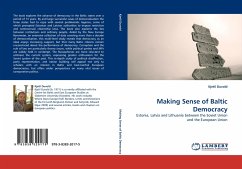The book explores the advance of democracy in the Baltic states over a period of 15 years. By and large successful cases of democratisation the three states had to cope with several problematic legacies, some of which prompted Estonian and Latvian authorities to impose restrictive and controversial citizenship laws. The book also explores the ties between institutions and ordinary people. Aided by the New Europe Barometer, an extensive collection of data covering more than a decade of democratisation, this multi-level study reveals that democracy as an ideal enjoys increasing support, but that many Baltic citizens remain unconvinced about the performance of democracy. Corruption and the rule of law are particularly thorny issues, while political parties and MPs are widely held in contempt. The Russophones are more reluctant to embrace the current system, expressing greater enthusiasm for the Soviet system of the past. This in-depth study of political disaffection, party representation, and nation building will appeal not only to scholars with an interest in Baltic and East-Central European democracies, but offers wider perspectives on many vital issues of comparative politics.
Bitte wählen Sie Ihr Anliegen aus.
Rechnungen
Retourenschein anfordern
Bestellstatus
Storno








